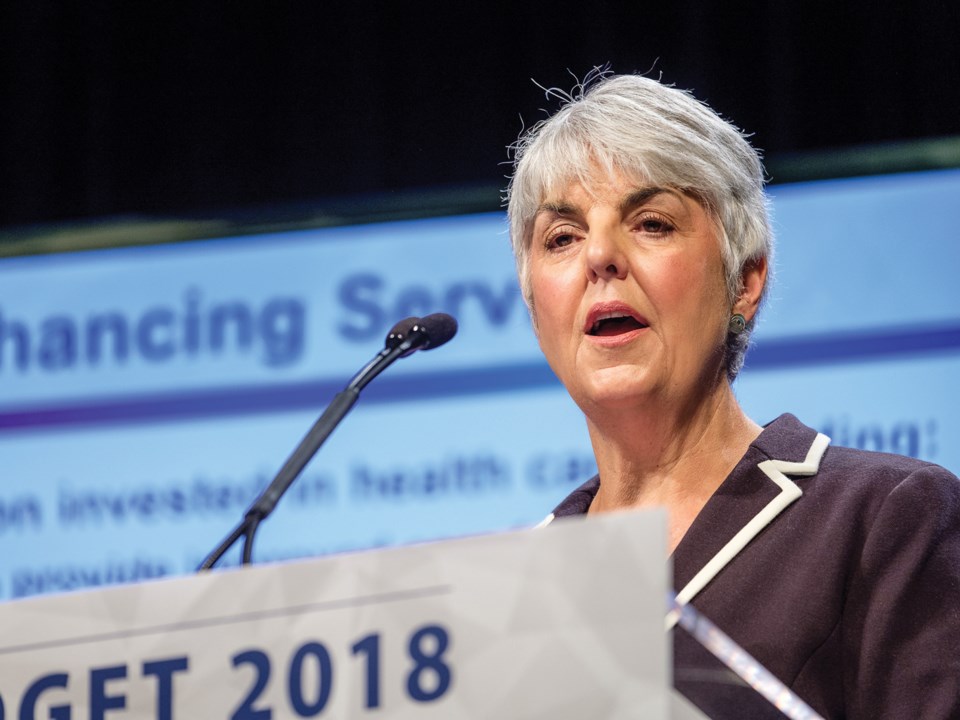Finance Minister Carole James says the NDP government’s books will be balanced, with a projected surplus of $219 million for the coming fiscal year.
James outlined the government’s first full budget Feb. 20, with major initiatives that focus on child care, housing affordability and eliminating MSP premiums faster than originally promised.
Ferries
The budget also confirmed the NDP’s promise to reduce BC Ferries fares by 15 per cent on minor routes, including Langdale-Horseshoe Bay and Earls Cove-Saltery Bay. Fares on the three major routes between the Lower Mainland and Vancouver Island will be frozen.
The government will also restore free passenger trips for seniors from Mondays to Thursdays.
“I think everyone expected this to be in the budget and I’m really glad it was,” said Nicholas Simons, NDP MLA for Powell River-Sunshine Coast. “This is something that people in the communities I represent consider pretty important.”
It’s estimated the fare reductions, which begin April 1, will cost the government $27 million this fiscal year.
Affordable Housing
The NDP plans to tackle housing affordability by spending on housing projects, increasing the foreign buyers tax and introducing a new speculation tax, but neither tax will apply to the Sunshine Coast.
The taxes will apply only in Metro Vancouver, the Capital Regional District, the Fraser Valley, the Central Okanagan and the Regional District of Nanaimo.
Simons said he doesn’t agree with excluding the Sunshine Coast Regional District. “I’ve raised this issue and I’m looking for an answer,” he said. “We’re going to feel the pinch from [being excluded].”
The foreign buyers tax will rise from 15 to 20 per cent. The new speculation tax will start at 0.5 per cent of assessed value for foreign and domestic homeowners who do not file income tax in B.C.
On the investment side, the province plans to spend more than $1.6 billion over three years to build and maintain affordable rental housing on top of the $208 million announced in the 2017 budget update.
Matt Thomson of the Sunshine Coast Affordable Housing Society, which is hoping for provincial funding for a rental project in Gibsons, said it’s an enormously important announcement.
“For us, this means a stable ongoing pool of funding that we can apply to on our proposed 40-unit development, but also future developments as we progress to look at other opportunities in Gibsons, Sechelt and other areas of the Coast,” Thomson said.
“With matching federal dollars from the National Housing Strategy, we anticipate being very active in coming years developing new housing.”
Child Care
The budget did not include the $10-a-day daycare scheme that was part of the NDP election platform, but James said the government will invest more than $1 billion over the next three years to “set the province on the path to a universal child care plan.”
The money will be used to create more than 22,000 child care spaces across the province and help operators get licences and train workers. Simons said he thinks that will be a big help on the Sunshine Coast, where daycares have faced a staffing crunch.
He said a related initiative will also have a big impact locally. “We’re providing some incentives for operators to open outside of the regular business hours, which is something that on the Sunshine Coast is significant because we have a lot people who work shift work.”
Direct support for parents includes a child care benefit aimed at reducing child care costs by up to $1,250 per month per child and licensed child care providers will get up to $350 per month to reduce fees.
MSP
The NDP government plans to eliminate MSP premiums by Jan. 1, 2020 and replace the MSP program with an employer health tax which will be set at 1.95 per cent of payroll for companies with an annual payroll over $1.5 million. It will be less for businesses with payrolls between $500,000 and $1.5 million, and will not apply to businesses with a payroll of less than $500,000 per year.
The government expects to bring in $463 million through the new tax this fiscal year.
First Nations
The budget also included several programs for First Nations and Indigenous people, including $50 million in 2017-18 to the First Peoples’ Cultural Council for the revitalization of traditional languages.
Simons, who worked with the shíshálh Nation before entering politics, said he’s particularly proud of that initiative. “It’s not something that everyone is going to immediately recognize the benefit of, but I think it demonstrates our commitment to what we say about empowerment, reconciliation and strengthening communities.”
The government is also planning to spend $201 million over three years for First Nations housing, child care, skills training, Aboriginal Friendship Centres and other resources.
The Ministry of Indigenous Relations and Reconciliation will get $5 million over three years “to support its enhanced mandate to establish a clear, cross-government vision of reconciliation, including United Nations Declaration on the Rights of Indigenous Peoples implementation, progress on the Truth and Reconciliation Commission’s calls to action and treaty transformation.”
Opposition Reaction
Green leader Andrew Weaver said he supports the budget’s broad goals, but thinks the NDP missed the mark in a few areas. “We are still concerned that the challenges presented by the emerging economy, and the challenge of climate change in particular are not receiving adequate attention. Without a clear vision and decisive action we risk undermining all of the progress we could make on child care and housing,” he said.
Shirley Bond, the BC Liberal co-critic on finance, said the NDP government is hiking taxes without delivering on key promises.
“The BC NDP have no plan to grow the economy, no plan on how to pay for all the spending,” Bond said. “If all of this sounds vaguely familiar, it’s because we’ve heard this story before. Welcome back to the NDP of the 1990s and remember, the sequel is always worse.”



